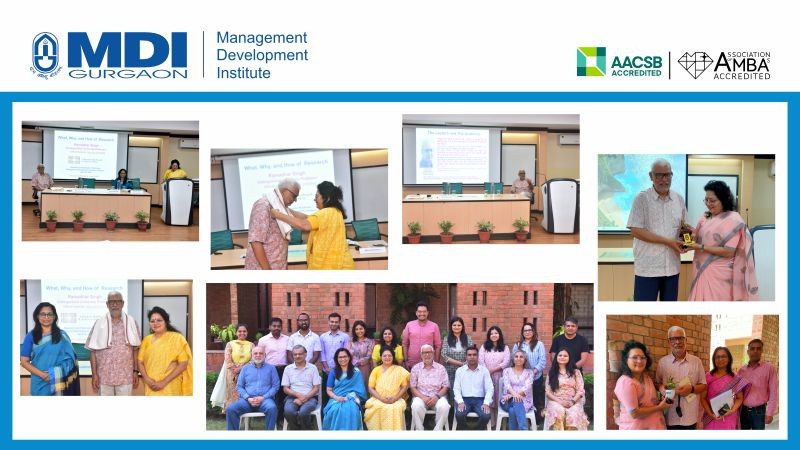April 30, 2024

The MDI Gurgaon was delighted to host Distinguished University Professor Ramadhar Singh, Ahmedabad University, Ahmedabad, Gujarat (https://bit.ly/3fXiB0d) for a four-day workshop on Research and Publications for doctoral scholars during April 25-30, 2024. Professor Singh, the 2022 Distinguished Alumnus in Psychological Sciences of Purdue University, is a fellow of six professional bodies of psychology, including the American Psychological Association and the British Psychological Society. The Association for Psychological Science included him among the Faces and Minds of Psychological Science in 2013 and the Society for Personality and Social Psychology inducted him on the Heritage Wall of Fame in 2022 from India.
From his 55 years of academic experiences at Patna University, IIT Kanpur, IIM Ahmedabad, National University of Singapore, University of Rochester, Oxford University, Purdue University, and IIM Bangalore, Professor Singh shared his valuable insights on impactful research and publications.
Lessons Learnt
Research means (1) questioning the status quo (i.e., the mess we are in) and (2) offering a better alternative. Science specifies ERRORs around a seeming TRUTH uncovered by a theory, method, and/or analysis used in the study.
Whether one does experimental (i.e., testing causal hypotheses) or correlational (i.e., investigating relations among individual difference variables) research, a paradigmatic framework is always more exciting and informative than the “I-wonder-what-would happen-type” one.
Mythology, philosophy, literature, and everyday observations provide research scholars with rich set of ideas for testing hypotheses about both the correlational and causal relations.
To understand a phenomenon fully, the investigator must specify not only the relation between two variables but also what make them related (i.e., mediation) and under what circumstances (i.e., moderation).
To initiate students to research, the supervisor must
(a) Develop expertise in a theory and apply it to related areas.
(b) Develop one method and use it in other areas for conceptual clarity.
(c) Master one analytic procedure and close the loopholes in the facts and principles of other research paradigms.
(d) Read and edit every report thoroughly to make it part of the student’s self-image.
Clear and grammatically correct writings are necessary and no less important parts of a research report or dissertation than the topic, hypothesis, method, and/or analysis. The 12- to 15-word title must convey the key message of the report, and the 100- to 250-word abstract must motivate reading of the report.
A published paper must advance knowledge from conceptual, methodological, and /or applied angles. Let us refrain from creating an erroneous impression of our scholarship or productivity by publishing a sloppy piece of research!
Given the growing cases of published articles getting retracted from journals in recent years, scholars must restore the public trust in the legitimacy of their respective discipline, profession, and institution.
Participants in the Fellow Program in Management (FPM) of the MDI Gurgaon thanked Professor Singh for educating them the cores of research: What, why, and how. They all learned how he himself has been conducting paradigmatic research in psychology and management as well as motivating his protégés to do the same with rigor and relevance. With his satirical brilliance and suitable quotations from Hindi literature, Professor Singh truly sensitized them to undertake only impactful research in their respective fields. We believe that his perspectives on research and publications have the potential of turning India into one of the self-reliant nations in knowledge-generation, a vision that our Prime Minister Narendra Modi had shared with the delegates to the 2023 Indian Science Congress held in Nagpur.